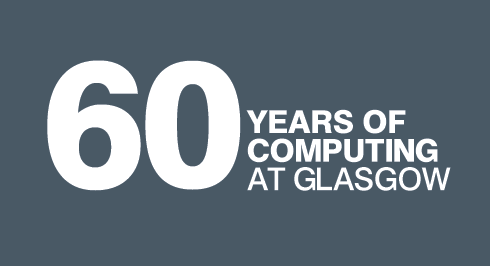The Future of Computational Science
Posted on 16 January 2018
The Future of Computational Science
 By Blair Archibald, Software Sustainability Institute Fellow
By Blair Archibald, Software Sustainability Institute Fellow
How do you bring research domains together?
This is a difficult question to answer, fields have their own focuses, terminology and idiosyncrasies; what appeals to a researcher in one field may not appeal to a researcher in another. However, with over 92% of researchers suggesting they make use of computational science in their research is it possible that computational techniques could be used to help bridge domains? This post documents my experiences in organising an event aimed specifically at trying to exploit this idea within a single University environment.
60 Years of Computing at Glasgow
Although we have been computing for many decades, Computing Science and the use of electronic computing machines is relatively recent. This year, the School of Computing Science at the University of Glasgow has been celebrating 60 years of Computing at the University of Glasgow. In 1957 they became the first University in Scotland to order a computing machine, an English Electrics DEUCE machine.
As part of these celebrations, myself and a group of fellow Ph.D. students, organised an event aimed at Ph.D. students from within the University to help answer the question: can computation be used to bring domains together?
We called the event: The Future of Computational Science to highlight that we wanted to discuss where computational science as a whole is going and also to acknowledge the fact that many Ph.D. students in the audience will become future leaders in their fields and this was an opportunity to highlight the importance computation may play in the future.
The Events
It's difficult to arrange an event with a wide level of appeal: assuming too much computational knowledge discourages beginners, while assuming too little computational knowledge can make the event seem tedious to those more advanced.
To overcome this we decided to run a range of events, rather than a single event. While the overheads of organising increase, it can really help to increase participation.
We decided on the following events:
-
A Software Carpentry workshop: sponsored by EPCC/Archer Training, this workshop was targeted mainly at beginners and covered the basics of Git, make, Python and SQL in a two day intensive manner.
-
A Docker for Reproducible Research workshop: targeted mainly at a more advanced audience, this hands-on workshop looked at why Docker can be useful for reproducible research, how to reproduce an existing experiment, and the steps required to create your own reproducible experiment. The materials for this workshop are available online here.
For more on Docker for reproducible research, check out the Docker Containers for Reproducible Research Workshop organised by the Institute in 2017.
-
A Data Visualisation workshop by Tableau: research often requires some exploration of the data. Through both a seminar and a hands-on tutorial, this event explored techniques for effective data visualisation (use of colour, fonts etc.) as well as how graphical tools can be used to good effect for quick data exploration.
-
A Day of Speakers and Discussion: this was the main event that really aimed to bring the interdisciplinary audience together. It featured keynotes from Barry O'Sullivan, from The Insight Centre, Cork, and Neil Chue Hong, Director of the Software Sustainability Institute, discussing their experiences working with computation in an interdisciplinary environment, and also a host of short talks and panel discussions. The key emphasis on this event was interdisciplinary; we wanted people to get talking to see if, and how, computation can form a shared interest/framework between the disciplines.
Organisational Tips
I'd like to briefly finish this post with a few quick organisational tips that I hope can help others when planning similar events:
-
Work as a team: while I'm sure many people do successfully organise events on their own, having a team around you can really give you the confidence to "think big". Whether it's organising sub-events, stopping you seconding guessing yourself by giving you feedback on your event adverts and generally having some support here really keeps things ticking along!
-
It's all about the people: while it's important that the event reflects something you enjoy, it's also important that you keep it as open as possible. Make sure there is a little something for everyone; whether that's full events, such as Software or Data Carpentry for beginners, or just a few less technical discussions or talks during the main event.
-
Start early: an event of the scale we ran took about a year to fully organise. This is particularly true if you need to concurrently work on your own research/job!
Finally, although it takes a lot of effort, organising an event is a highly rewarding experience: you get to meet new people and make new friends, you learn a lot about the organisational structures at your institution, and eventually you get to see the hard work paying off as everyone (hopefully!) enjoys your event.
In a follow-up post, I'll reflect on the events and lessons learned so that hopefully you can avoid similar pitfalls.

